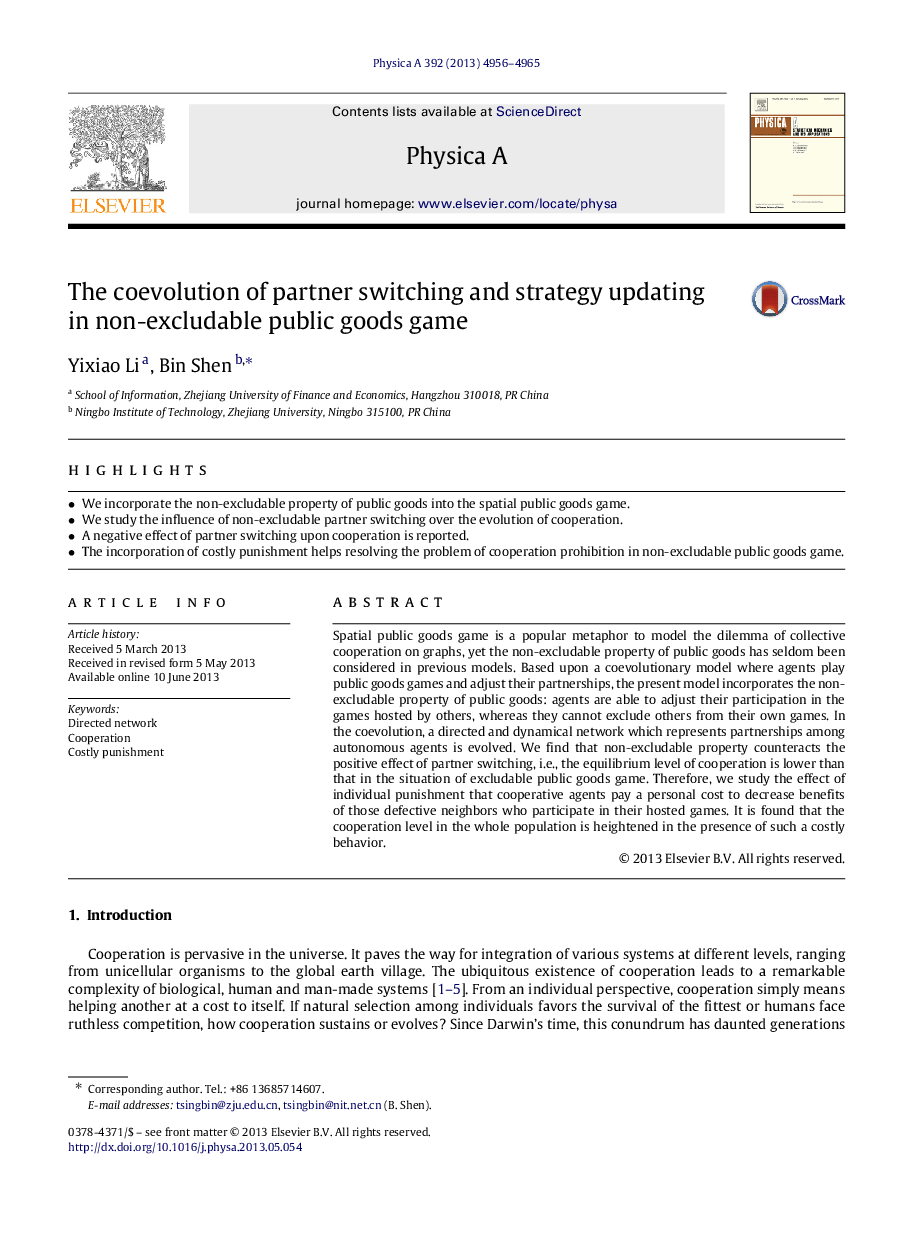| کد مقاله | کد نشریه | سال انتشار | مقاله انگلیسی | نسخه تمام متن |
|---|---|---|---|---|
| 10481891 | 933244 | 2013 | 10 صفحه PDF | دانلود رایگان |
عنوان انگلیسی مقاله ISI
The coevolution of partner switching and strategy updating in non-excludable public goods game
ترجمه فارسی عنوان
هماهنگی تعویض شریک و به روز رسانی استراتژی در بازی کالاهای عمومی غیر قابل تعویض
دانلود مقاله + سفارش ترجمه
دانلود مقاله ISI انگلیسی
رایگان برای ایرانیان
کلمات کلیدی
شبکه راننده، همکاری، مجازات پرهزینه،
ترجمه چکیده
بازی کالاهای عمومی فضایی یک استعاره محبوب است که مدل معضلات همکاری جمعی در نمودارها را نشان می دهد، با این حال ملک غیر قابل اجتناب از کالاهای عمومی به ندرت در مدل های قبلی مورد توجه قرار گرفته است. بر اساس مدل هماهنگی که عاملان بازی های عمومی کالاها را بازی می کنند و مشارکت خود را تنظیم می کنند، مدل کنونی، ملک غیر قابل اجتناب از کالاهای عمومی را شامل می شود: عوامل می توانند مشارکت خود را در بازی های میزبانی شده توسط دیگران تنظیم کنند، در حالی که نمی توانند دیگران را از بازی های خود را در هماهنگی، یک شبکه کارآمد و دینامیکی که مشارکت میان عوامل مستقل را نشان می دهد، تکامل یافته است. ما متوجه می شویم که اموال غیر قابل تعویض اثر مثبت تعویض شریک را تحت تاثیر قرار می دهد، یعنی سطح تعادلی همکاری کمتر از وضعیت موجود بازی کالاهای قابل تعویض است. بنابراین، ما بررسی اثر مجازات فردی که عوامل تعاونی هزینه های شخصی را برای کاهش مزایای آن همسایگان ضعیف که در بازی های میزبانی خود شرکت می کنند مطالعه می کنند. مشخص شده است که سطح مشارکت در کل جمعیت در حضور چنین رفتار پر هزینه افزایش می یابد.
موضوعات مرتبط
مهندسی و علوم پایه
ریاضیات
فیزیک ریاضی
چکیده انگلیسی
Spatial public goods game is a popular metaphor to model the dilemma of collective cooperation on graphs, yet the non-excludable property of public goods has seldom been considered in previous models. Based upon a coevolutionary model where agents play public goods games and adjust their partnerships, the present model incorporates the non-excludable property of public goods: agents are able to adjust their participation in the games hosted by others, whereas they cannot exclude others from their own games. In the coevolution, a directed and dynamical network which represents partnerships among autonomous agents is evolved. We find that non-excludable property counteracts the positive effect of partner switching, i.e., the equilibrium level of cooperation is lower than that in the situation of excludable public goods game. Therefore, we study the effect of individual punishment that cooperative agents pay a personal cost to decrease benefits of those defective neighbors who participate in their hosted games. It is found that the cooperation level in the whole population is heightened in the presence of such a costly behavior.
ناشر
Database: Elsevier - ScienceDirect (ساینس دایرکت)
Journal: Physica A: Statistical Mechanics and its Applications - Volume 392, Issue 20, 15 October 2013, Pages 4956-4965
Journal: Physica A: Statistical Mechanics and its Applications - Volume 392, Issue 20, 15 October 2013, Pages 4956-4965
نویسندگان
Yixiao Li, Bin Shen,
